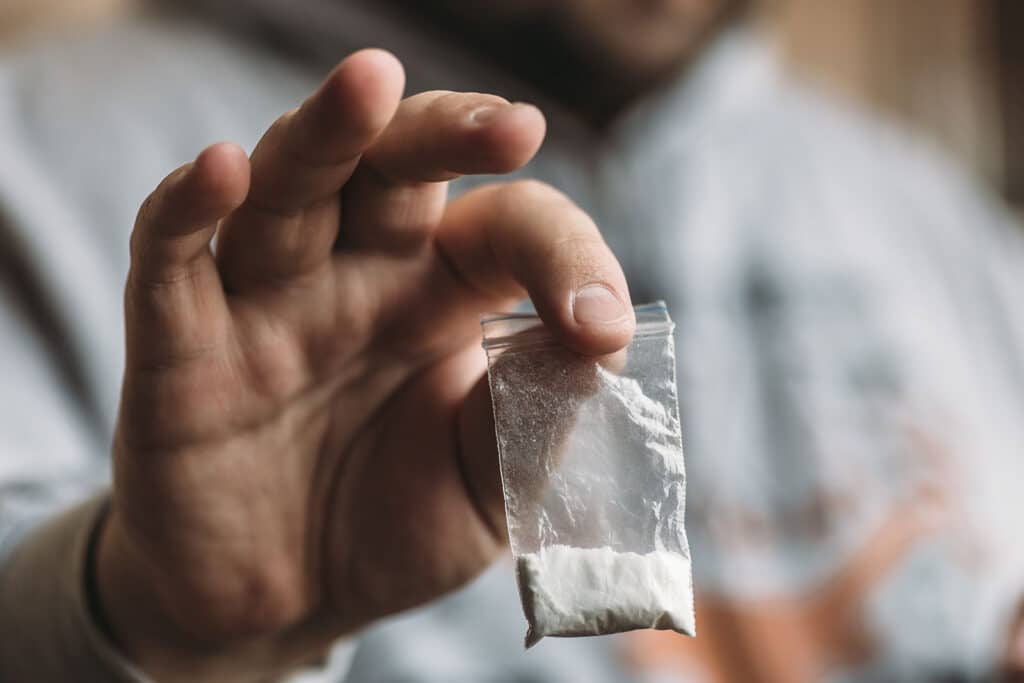Cocaine Addiction Treatment in New York
Cocaine is one of the most addictive substances across the nation and is becoming a growing crisis year after year. Besides its life-threatening overdose risks, its long-term effects are also incredibly hazardous.

Addiction can be a frightening and isolating experience, but luckily, there is help available. This guide will provide you with information on cocaine addiction treatment options in New York to help you or your loved ones.
We’ll also explore the factors that make cocaine so addictive, the dangers of prolonged use, and how to recognize its early and late patterns.
What Makes Cocaine So Addictive?
Cocaine is one of the most addictive central nervous system stimulants. The drug’s addictive potential comes from various properties associated with how it works.
The drug works by blocking the reuptake of dopamine, a brain neurotransmitter associated with pleasure.
This surge in dopamine creates an intense feeling of euphoria, which is highly reinforcing and pushes users to crave more of the drug.
However, the pleasurable effects are also short-lived, as the body develops tolerance toward the drug and becomes less sensitive to its effects.
To achieve the same pleasurable effects again, users need to take increasingly higher doses of cocaine, which leads to dependence. This quickly develops into addiction where the body experiences severe withdrawal symptoms when the effects of cocaine start wearing off.
Is Cocaine Addiction Common in New York?
Cocaine addiction is a major public health issue in the state, especially in New York City, as it’s one of the most commonly used substances across different age groups.
In 2013, a report by the New York City Department of Health showed that over 150,000 New Yorkers, or roughly 2.4% of the population, struggled with a cocaine use disorder, and the numbers kept growing over the years to around 6%.
The same report also shows that cocaine accounts for around 33% of all drug-related emergency admissions. The CDC also shows that cocaine alone was responsible for over 21% of all overdose deaths in 2021.
The problem with cocaine addiction isn’t only because of its high addictive potential and risk of overdose, as it’s also associated with its long-term effects.
As a stimulant, cocaine can push many organs beyond their limits, which leads to serious chronic complications.
For instance, cocaine addiction can lead to various cardiovascular problems that would last long after recovery. That’s why treating cocaine addiction should always be done as soon as possible to minimize that risk.
Common Causes of Cocaine Addiction
The causes of cocaine addiction can vary significantly and even include personal reasons that vary from one individual to another. However, there are some common reasons that lead many people to fall victim to cocaine addiction.
Stressful Environments
Chronic stress can be a major trigger for cocaine use. People facing constant pressure whether in their social, academic, or professional environments may turn to cocaine as a temporary escape.
Some might even mistakenly abuse cocaine’s stimulating effects as a method to become more active, especially while trying to overachieve.
Early Exposure and Lack of Awareness
Early exposure and use of drugs can prime the reward system for dependence. In fact, many studies show that teenagers and young people’s developing brains are more susceptible to the addictive effects of the drug.
In New York, access to cocaine is unfortunately quite easy, whether on the streets or even online through illegal black markets.
Misconceptions and glamorization of cocaine use in certain social circles make it seem more appealing, especially to young adults, which makes them fall for peer pressure.
This is also fueled by inadequate public awareness of the dangers of cocaine addiction, in addition to the stigmatization that can prevent people from seeking help.
History of Abuse and Drug Use
Individuals with a past history of abusing substances, including alcohol, are much more likely to develop a cocaine addiction. This might be due to underlying mental health issues or as an attempt to self-medicate with drugs.

Being Within a High-Risk Group
Besides the previously mentioned causes, there are other risk factors that can increase the likelihood of developing addiction, including
- Genetic predisposition to stimulant addiction, which leads some people to abuse more potent stimulants like cocaine.
- Suffering from mental health disorders like depression or ADHD
- Lack of parental supervision in the case of adolescents
How to Identify Cocaine Addiction
Addiction can manifest in various ways, and many of its signs and symptoms are similar across different forms of addiction.
In the case of cocaine, some signs appear soon after use while others might develop over some time. Here’s a breakdown of short-term and long-term symptoms to help you identify them:
Short-Term Signs and Symptoms
- Increased heart rate
- Dilated pupils
- Insomnia and difficulty sleeping
- Restlessness and tremors
- Hyperactivity and talkativeness
- Excessive sweating
- Runny nose
- Loss of appetite
- Impulsive behavior and a noticeable increase in risky actions
Long-Term Signs and Symptoms
- Severe weight loss due to malnutrition and hyperactivity
- Appearance of drug-administration signs (damage to the nasal septum from snorting, bruising near injection sites)
- Heart problems, including hypertension and increased risk of stroke
- High risk of seizures and cardiac arrest
- Severe mood swings with depression and anxiety
- Difficulty concentrating on tasks
- Withdrawal from society
- Neglecting hobbies and interests
- Financial difficulties due to drug use and resorting to stealing or violence
Cocaine Addiction Treatment Methods
Although treating cocaine addiction is quite challenging it’s not entirely impossible. The following is a brief overview of the different treatment options available for this condition.
Medical Detoxification
All forms of substance abuse, including cocaine addiction, must start with detoxification. This is the process where the body safely eliminates cocaine from the body.
This step is usually done under intense medical supervision in rehab facilities to manage the life-threatening withdrawal symptoms.
In mild cases, medical professionals might allow patients to stay at home under supervision while intense medical treatment, which is typically known as “outpatient treatment”.
The duration of detox varies depending on the severity of addiction, but for cocaine addiction, it typically lasts between 4 to 8 weeks.
Behavioral Therapy
After detox, overcoming cravings and changing addictive behaviors becomes crucial for long-term recovery.

That’s why behavioral therapy becomes the main form of recovery for the rest of the treatment process. This one can take various forms, including Cognitive Behavioral Therapy (CBT).
This is a type of evidence-based therapy that helps patients identify and abolish negative thought patterns and encourages them to use cocaine by equipping them with skills to manage stress and cope with factors.
There’s also a subtype of CBT, called Dialectical Behavioral Therapy (DBT), which is also effective in treating addiction.
It focuses on emotional regulation and impulse control to teach patients healthy coping mechanisms to deal with triggers that previously led them to cocaine.
Supportive Medications
While there are no FDA-approved medications that specifically treat cocaine addiction, medical professionals might recommend medications that show promise in reducing cravings during detox, such as disulfiram.
Doctors might also recommend medications that soothe the severity of withdrawal symptoms. This form of supportive medication includes
- Anti-seizure medications like Topiramate and Tiagabine
- Less potent stimulants for dose tapering like Modafinil
- Muscle relaxants like Baclofen
Group Therapy
Support groups provide a safe space for individuals in recovery to connect with those who face similar challenges.
This raises a sense of community and helps patients overcome the isolation associated with addiction and recovery.
Group therapy can include a variety of forms, with the most popular ones being 12-step meetings like Narcotics Anonymous.
There are also non-12-step meetings that focus on personal responsibility and peer support to overcome addiction.
Complementary Treatments
In addition to these core methods, holistic approaches can also increase the effectiveness of treatment by improving mood and well-being, such as exercise, yoga, acupuncture, meditation, and healthy nutrition.

Important Notes on Cocaine Addiction Treatment
Lastly, here are some additional notes to keep in mind while treating cocaine addiction for improved results and long-term recovery:
- Realistic Expectations: You should always understand that cocaine addiction has a high relapse potential. That’s why sticking to treatment after detoxification and seeking various treatments is critical for relapse-free recovery.
- Seeking Professional Help: Every case of cocaine addiction is different, and so should be its treatment plan. That’s another reason why you should always seek the help of professionals while addressing this serious problem.
- Involving the Family: Feeling isolated can be both a cause and result in the case of cocaine addiction. For that reason, it’s essential for families and the surrounding community to show support during these difficult times for better results. Family therapy can also address the relationship problems that addiction might have caused.
Finding Reliable Cocaine Addiction Treatment in New York
Overcoming cocaine addiction is a challenging journey but it’s not an impossible one if you have the right type of support.
As you can see, various forms of treatment can help individuals suffering from addiction achieve lifelong recovery.
If you or your loved ones are struggling with cocaine addiction in New York, don’t hesitate to get a confidential assessment and seek expert help from our recovery advocates at Mid Hudson Addiction Recovery right away.

